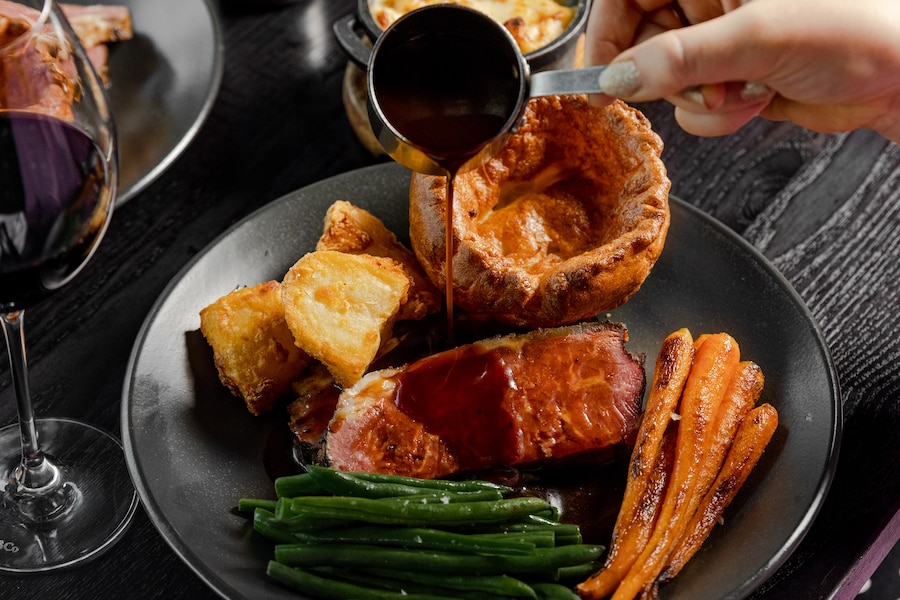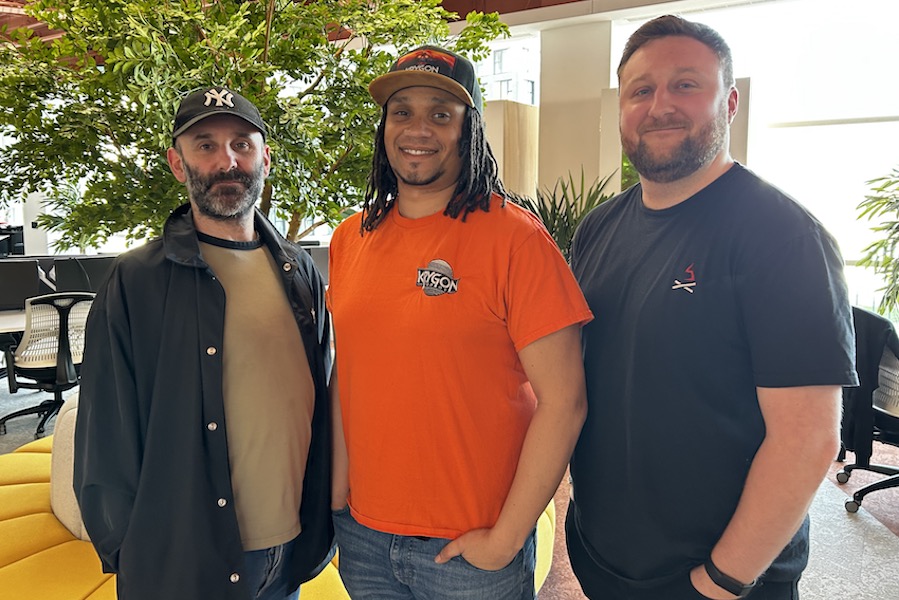Worker Bee: meet Mary-Ellen McTague, the Manchester chef and philanthropist
- Written by Chris Greenhalgh
- Last updated 2 years ago
- Charity, Cornerstone, Food & Drink, People
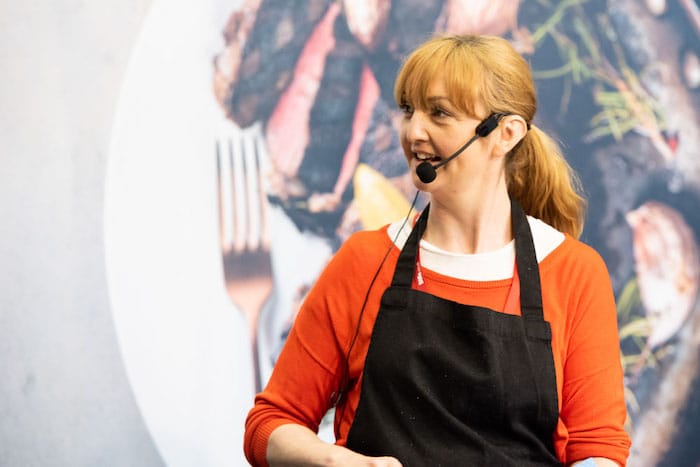
Born in Bury, Mary-Ellen McTague is a Greater Manchester-based chef who trained under Heston Blumenthal, and, much like her mentor, is way ahead of her time when it comes to food. Many may remember her first proper fine dining restaurant in Prestwich called Aumbry.
Despite much love from the northern town on the up and critical acclaim, Aumbry closed in 2014 as she took her assets to Manchester city centre to launch a pop-up restaurant in the Northern Quarter called 4244. Mary-Ellen’s spell in Prestwich left a long-lasting taste in people’s mouths and pretty much single-handedly put the village on the culinary map.
She is a warm, wholesome and modest food philanthropist. Since migrating her skills and charm to the city centre, she has become one of the city’s most sought after and collaborative chefs. She’s used her 20+ years experience and reputation for good and launched Eat Well MCR, a charity initiative providing chef-made meals to people sidelined by poverty across Greater Manchester.
Mary-Ellen recently almost single-handedly delivered a mass community Sunday roast at the inaugural We Invented The Weekend festival – with free meals for the community.
What got you started in your field of work?
I started cooking professionally when I was just turned 21.
I was doing a languages degree at Manchester Uni and working part-time at The Roadhouse which was a music venue, and absolutely hating my uni course. I come from a big family of food lovers. Food was a big part of all of our socialising and family parties. I really loved food and cooking and the venue I was working for [The Roadhouse] was looking for someone to offer hot food to the touring bands as part of their rider, but also so they could keep their late-night booze licence, so I started cooking there. So I was juggling cooking there and doing my uni course but then just had a bit of a eureka moment in the bath where I realised I hated being at uni but loved cooking, so I should be cooking instead. So it was very much a snap decision, really, not based on anything but based on just a kind of instinct that cooking was what I loved and academia wasn’t really working out for me.
Doing what you love for work is one of life’s biggest joys and the opposite is one of life’s biggest mojo drains. It’s awful, obviously, lots of people have to do it but I feel very lucky to have found something that I love, for sure.
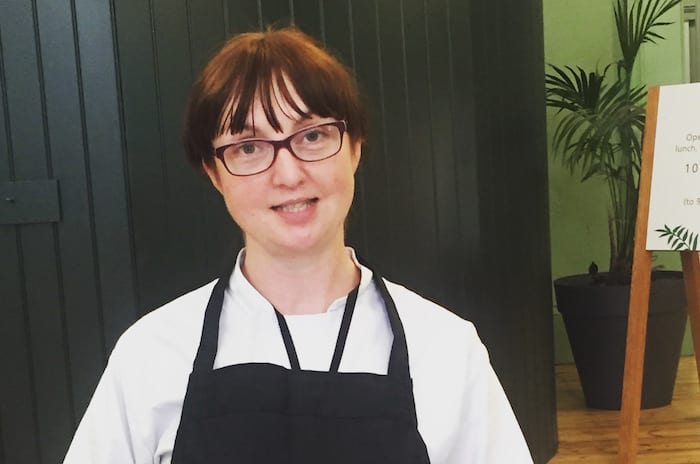
Eat Well MCR came about, again it was a fairly overnight thing. I had spent a bit of time working for a waste food project, it was called Real Junk Food Manchester – now called Open Kitchen with a cafe at the People’s History Museum. And so I spent some time working with them which opened my eyes to not only food inequality and food poverty but food waste and how our food production and distribution systems work in this country, in a very wasteful way and how supermarkets work in a wasteful way and then there are inequalities woven through that, obviously having the greatest impact on the people with the least money. It was getting towards lockdown and we were closing and I realised all the restaurants and cafes and pubs that would be closing, everywhere really but there was nothing I could do about the whole country, so I thought possibly I could do something with the food that others can’t.
A lot of the stuff can be taken to food banks but quite a lot you can’t – like unlabelled restaurant delivery food can’t just be donated somewhere – so I thought I need to do something about this. The restaurant was closing so I thought what else am I going to do? So I put a shoutout on social media and asked if there was anywhere that was closing and didn’t know what to do with their surplus food that was potentially going to go to waste. There was a big response to that and I ended up with a restaurant that was absolutely packed to the rafters with food really quickly. And then I was like ‘shit’ and another social media shoutout to ask if anyone can help me to cook this food, process it, and lots of people said ‘Yes’. At the same time, my sister who is a doctor, she’s quite senior in Sheffield, was talking to me about staff, nurses, and doctors, who are going to be doing horrendously long shits, so I asked what can I do to help and she said: ‘you could give them a hot meal.’ So the first thing we decided to do with all this food was take it to NHS wards. I contacted lots of hospitals and worked out if they were in need of any meals, when they would want them and how many, and started taking food to NHS staff. I think within a few days we joined the Manchester emergency food response because the council had taken lots of homeless people into isolated hotels where there was no food provision. I got a call asking ‘Can you get 70 meals to a hotel in Gorton in a couple of hours?’ so I said ‘yes, I have a restaurant full of food’, and it kind of all snowballed. So it started with NHS staff, moved quickly to supplying meals to homeless individuals in hotels and expanded from there. There were lots of individuals crying out for help with food.
These days we don’t feed NHS staff anymore, we work mostly with homeless families living in B&Bs with no access to refrigeration or cooking facilities, so that’s a huge part of what we do. We still take food to women in refuge and parents with children on long-term sick stays at Manchester Children’s Hospital. We just want to help people who are going through a difficult time, who are in need of a nice hot meal or a meal cooked by chefs with nice ingredients. It’s always been a bit about trying to provide as best we can a bit of a pick me up rather than trying to tackle the horrible horrible food and economic inequalities, which is obviously a government level policy thing. I think the point of us is to try to show lots of different people that they deserve a nice meal and they’re important. It is just a dinner but I do think it makes a difference. I know when we’ve all been having a rubbish time and someone shows up with a nice dinner or a casserole at your house, that’s important, that means something.
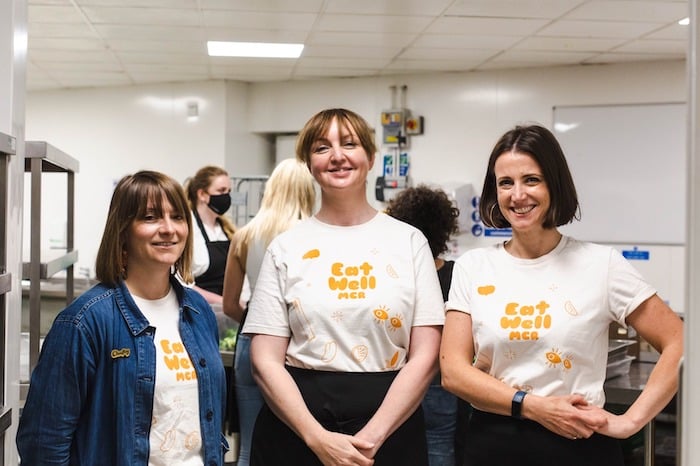
Who have been the biggest influences on your work?
Cooking-wise, the most important was Heston Blumenthal who I worked with for a couple of years. I have definitely got something from everyone I’ve worked with, you learn from colleagues as well as bosses but the most influential would be Heston. In terms of me developing my own style after that and getting more into traditional and historical food, and less stuff that’s really super high-end and a bit more homely would be Jane Grigson. All of her books are incredible, she was just an incredible writer and a brilliant cook. Her books are very accessible, user friendly and she’s got a lovely warm tone, but also really erudite, she really knows her food history with lots of little bits of background around each of the recipes. She writes in a really enticing way that makes stuff sound absolutely delicious. She is one of my favourite food writers with brilliant recipes but you could flick through and just enjoy the prose without really cooking anything. Her English Food Book is a particular favourite because I am quite interested in food history and local food history so this book is fantastic for putting her recipes in a historical context. And I love Elizabeth David as well, she’s also fantastic on food history.
What is your proudest achievement so far?
Eat well. It’s not just mine because if it were just down to me and my horrendous organisational skills we would not be here but there’s a team of us not just keeping it going but building it, growing it. There are 5 of us now working part-time on a very regular basis. Of course, it wouldn’t exist without the goodwill and incredible generosity of the hospitality industry, our fundraising wouldn’t work, and we wouldn’t be able to cook meals for people, when I say it’s my proudest achievement I’m not claiming it as mine but it is the thing I’m proudest of, to be sure. We started during a crisis when we weren’t thinking past the next few hours but even in the early days, after a month or two as we formalised and formed a board, we knew we wanted to keep it going past the pandemic because the needs we were aiming to address weren’t going anywhere, not soon anyway. The thing that was amazing about it was getting to connect with other chefs and restaurateurs, in a way that wasn’t possible previously. When you’re in a restaurant, particularly if you’re running it but also for the staff, it becomes your little world and you spend more time there than you do with your family or friends. Everyone was very focussed on work and it can become very insular, not competitive, not that people are against cooperating with others but everyone is so busy, now we’ve got a way of connecting up with other people in our industry. That’s just another great thing that has come of it.
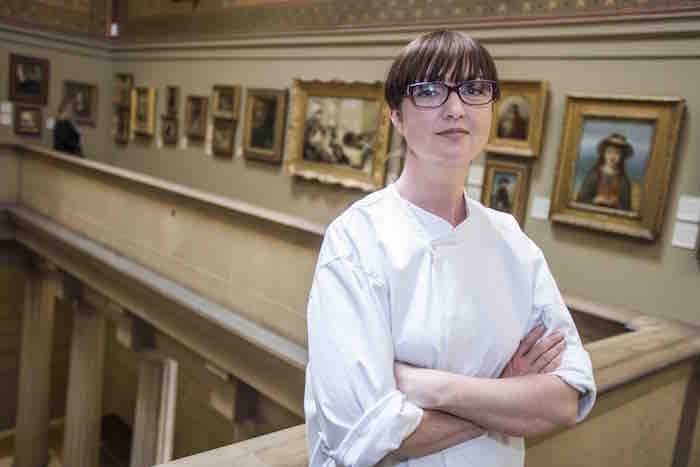
What does your typical day involve?
The short answer is, that there isn’t a typical day for me.
It depends, the kids live with me half of the week, so on a day with kids, it’s: get up, shoehorn two children out of the house with all the morning mayhem that I’m sure lots of people are familiar with.
I’m working mostly from home at the minute so I sit here [table in her kitchen] and juggle three jobs. It’s usually a case of going through my list, seeing what’s most urgent and trying to get those things done, and hoping there is some time left to do the other things. Eat Well involves quite a lot of different things so it’s quite a lot to juggle, there’s the new Treehouse Hotel in Manchester as well, that’s my other job, so I’ve got various big projects going on. It really varies, but mostly around trying to move things forward with Eat Well. A lot of our fundraising that we do now is through food events, for example, we curated the food for the VIP area of the Blue Dot music festival which was a massive job, we had never done it before and it turned out to be a lot more complicated than we expected but it was fantastic and a brilliant learning experience and I hope we can do it again. We tend to work up towards these big fundraising opportunities and then sleep for a few days. I’m mostly involved in Eat Well because of my background as a chef and we also have a coordinator who takes care of finding chefs to cook and distribute meals so we’ve divvied it all up now, at the start it was a case of me and the others driving around with sackfuls of veg in the car, picking up meals and taking them various places, thankfully it’s not quite as chaotic as it once was.
And how do you relax on your days off?
Generally, life is quite hectic, so I don’t get a lot of downtime. The best I usually get is a stolen evening with friends or if the kids are around we’ll just hang around at home, catch up on laundry, see friends and family, it’s really boring, I wish I could say the answer was that I go for long country walks and write and read and horse riding and abseiling but it’s not true, it’s largely battling domesticity, the jobs I’ve not had time to do in the week. I’m very happy having a quiet weekend where I see my mates and spend time with my kids. That’s a nice weekend to me and actually, I’ve only just started having weekends really because most of my adult life I’ve been working on Saturday and Sunday. I think I like pottering because the weeks are so busy it’s great not having loads of places that I need to be all the time.
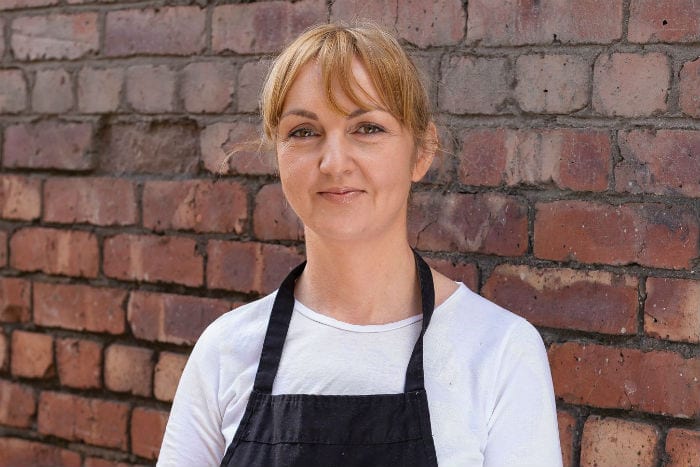
What is the best advice you have been given or can give?
One of the best pieces of advice I’ve been given is from my dad. This is what he’ll say to me if I’m in times of strife, work difficulties or whatever it is, he says ‘keep pedalling til you fall off the bike’. No advice about what you do once you’ve fallen off the bike though. He also likes to say ‘just because you’re paranoid doesn’t mean the fuckers aren’t out to get you’ so I’m not sure how solid his advice is.
I used to give a piece of advice when people first came into the kitchen, no experience, a bit terrified, I would say ‘if you want to, you can do and learn anything, it’s there for the taking’ but I think now the advice I might give has changed a bit because I’ve changed too, I used to love working 80-90 hours a week and do nothing but work crazy long shifts, but I can’t do that anymore, so my advice now might be ‘prioritise your time, have some rest, get some sleep.’
If things hadn’t worked out, what else could you have seen yourself doing?
Writing, is something I’m still working on. They say ‘writers write’ so I’m not really a writer because I don’t write, but I think about writing, and I worry about writing and I make notes all the time. Apart from writing the odd article and a few recipe columns and stuff, which I’ve really enjoyed, it’s great, if and when life allows it that’s something I would like to spend a lot more time doing. I’ve wanted to write since I was about 7 or 8 years old but it never occurred to me that that’s something that you do as a job, just as a hobby. I loved languages so perhaps I would have done something around that, but then I love the English language so that’s why I love writing. I was on this path where I thought I needed to go through high school, college, uni and then get a job so I didn’t really consider it as a career option as such and it’s probably a bit late now but that’s something I still really want to do, even if it as a hobby. I was diagnosed about 18 months ago with ADHD and I now think I can look back and see that the reason I couldn’t manage my uni course is because it was all about self-management and I just couldn’t organise my own schedule, so going into a kitchen where your time is tightly structured with a strict routine was something that really worked for me because the parameters really helped me when I was struggling.
Tell us one thing about yourself people might be surprised to hear…
There isn’t a lot I don’t tell people, I’m not a very private person so I’m trying to think of something. People might be surprised to hear that I hate offal. You’re not supposed to dislike foods as a chef but I’ve tried so many times to like them and I just don’t! I can cope with it and livers but I would never choose to eat it. And brains I would outright refuse to eat.
Red or Blue?
So, I couldn’t be any less bothered about football but my boys now are Manchester United fans so I guess by family association probably a red, but I’ve never been into football so it’s never been part of my life. Amongst my friends, it’s pretty much a 50/50 split between reds and blues.
If you could change one thing about Manchester, what would it be?
Ermmm… I really really like Manchester. I would love to see completely free school meals in all schools. I think that would be the right thing to do, I don’t know if you saw that clip of a dinner lady who had to turn kids away because there was no money on their cards, she was really upset saying she didn’t come into this job to starve children. I think the fact that free school meals are means tested is absolute nonsense and I think that if we could change that around Greater Manchester it would be an amazing way to lead the country in terms of how we are taking care of our population. There are definitely families who can’t afford enough food at home and therefore that’s one thing we can do to make sure that children are getting some of the nutrition they need.
And finally, what do you love most about Manchester?
It’s my home! So from a personal emotional connection, it’s where my loved ones are – not so much my family because most of them have moved away but – the friend group that I’ve had since I was a teenager. Also, it’s very vibrant, and constantly moving. Creative industries have always been very strong in Manchester and that’s something that I love. It’s a place with lots of opportunities for younger people. I’ve got nieces and nephews who are approaching 16 or 17 and there are lots of options for them in terms of what they can do next and I think that’s really important to support young people as they move towards independence. It feels like a very lively, vibrant, culturally eclectic and fun place to be, particularly with what’s happened with the food and drinks scene in the last 10 years, which is really fantastic to see. It was a bit late happening, it took a while for that critical mass of new openings but it has happened and Manchester is absolutely thriving.
- This article was last updated 2 years ago.
- It was first published on 8 September 2022 and is subject to be updated from time to time. Please refresh or return to see the latest version.
Did we miss something? Let us know: press@ilovemanchester.com
Want to be the first to receive all the latest news stories, what’s on and events from the heart of Manchester? Sign up here.
Manchester is a successful city, but many people suffer. I Love Manchester helps raise awareness and funds to help improve the lives and prospects of people across Greater Manchester – and we can’t do it without your help. So please support us with what you can so we can continue to spread the love. Thank you in advance!
An email you’ll love. Subscribe to our newsletter to get the latest news stories delivered direct to your inbox.
Got a story worth sharing?
What’s the story? We are all ears when it comes to positive news and inspiring stories. You can send story ideas to press@ilovemanchester.com
While we can’t guarantee to publish everything, we will always consider any enquiry or idea that promotes:
- Independent new openings
- Human interest
- Not-for-profit organisations
- Community Interest Companies (CiCs) and projects
- Charities and charitable initiatives
- Affordability and offers saving people over 20%
For anything else, don’t hesitate to get in touch with us about advertorials (from £350+VAT) and advertising opportunities: advertise@ilovemanchester.com

Manchester BMX club puts the wheels in motion to help a local hero
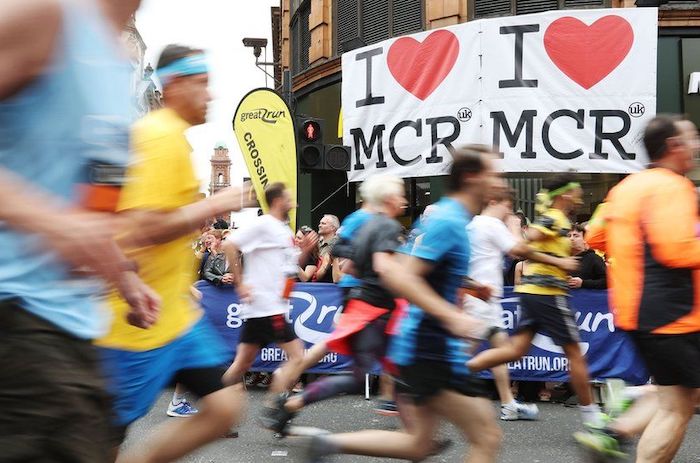
Celebrating the amazing people taking on Great Manchester Run in 2025

Frankie Lipman steps into Lady Macbeth’s shoes in gutsy new take on Shakespeare
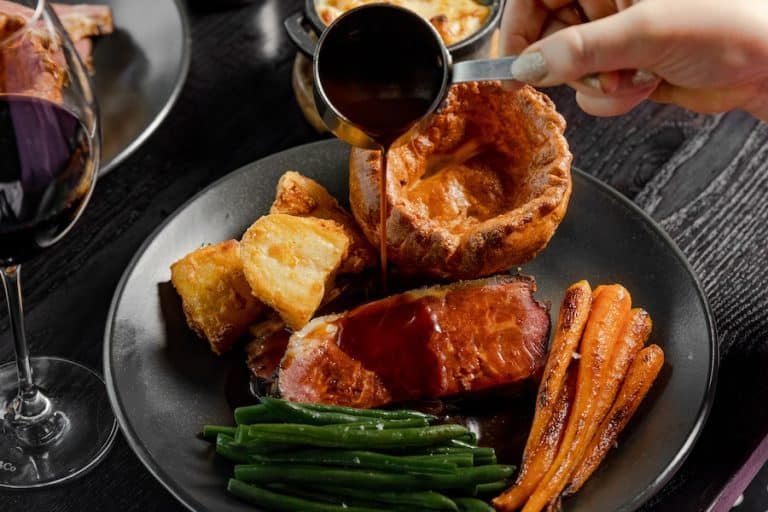

Best bars and pubs to watch the football and live sport in Manchester










